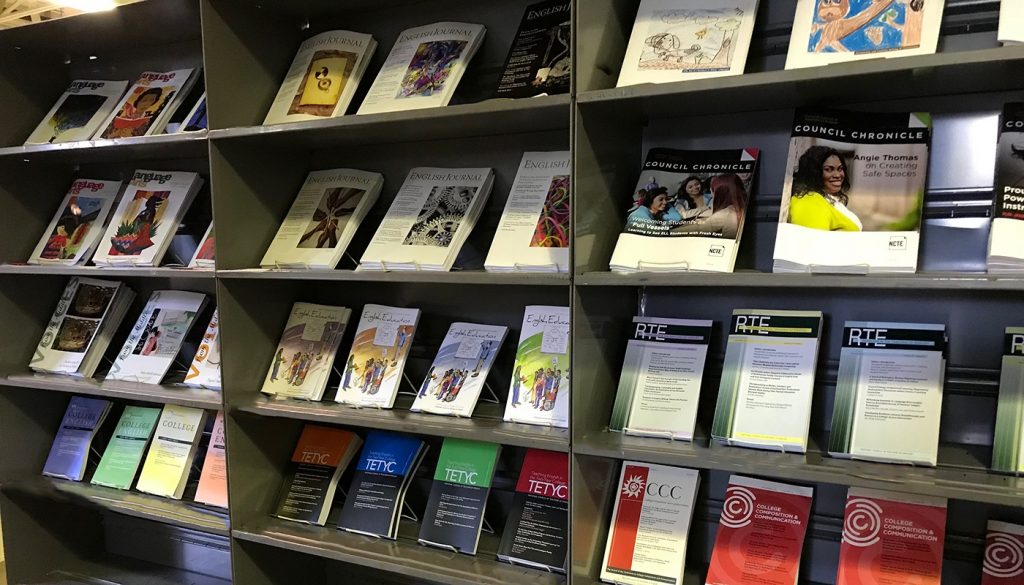NCTE’s peer-reviewed journals offer the latest in research, classroom strategies, and fresh ideas for educators at all levels. Whether you are an elementary language arts teacher or a literature professor, NCTE has a peer-reviewed journal for you, with content reflecting current research, trends, and strategies. Our 10 professional journals are available in paper and online, along with an extensive archive of past issues.
Here are five reasons why you should read your NCTE journals!
- They speak truth to power. In this interview with EdTalk Radio, English Journal editors Julie and David Gorlewski explain how they work with a community of educators to purposefully choose content that addresses our deepest concerns as teachers. While “there are enduring tensions in the field: how to teach grammar, whether to teach grammar in isolation or in conjunction with writing and reading, the canon of literature, and newer tensions like multiculturalism and standardization, what to do with technology, . . . it’s the students in our classrooms that count the most. . . . If these things are not questioned and thought about, then they don’t change.”
- NCTE journals offer professional learning on-the-go. All of our journals can be accessed online. Check out the Journal FAQ page if you have trouble logging in to read the online version.
- Reading about the work of others is inspiring and insightful. To quote from Can Reading Make You Happier?, a New Yorker article by Ceridwen Dovey: “When people read about an experience, they display stimulation within the same neurological regions as when they go through that experience themselves.”
- These are spaces where our expertise is celebrated and recognized. Whether you’re looking for a place to publish or a place to apply for an award, every journal is full of opportunities. Here are a few examples:
- Language Arts “Engaging Families in Language Arts Learning” Submission Deadline: September 15, 2018
- Voices from the Middle “What’s Next in Teaching Writing?” Submission Deadline: August 1, 2018
- English Journal “Fakery vs. Fact” Submission Deadline: September 15, 2018
- English Leadership Quarterly “Sustaining Teaching and Leadership” Submission Deadline: November 20, 2018
- This is where you go to be current. If you want to be ahead of the curve in practice, pedagogy, and thoughts around policy, these journals are always a hotbed of innovation and ideas. Check out some recent articles:
- “Perspectives on Practice: Is This Class Still Relevant? Teaching about Race in Literacy Teacher Education” by Maneka Deanna BrooksIn this contribution to Language Arts, a literacy teacher educator describes how she used responses to an assignment about race and literacy test scores to redesign course curriculum.
- “Fighting Fake News: Interdisciplinary Online Literacies for Social Justice” by Summer Pennell and Bryan Fede. In this article from Voices from the Middle, the authors share critical literacy strategies for middle school students reading online articles on social justice topics. These strategies can help students determine if news sources are reliable or merely “fake news.”
- “Exploring Survival: A Student-Led Unit in the Seventh-Grade English Classroom” by Emma SmithThroughout a unit of study about survival, students and their teacher engaged in individualized learning as described in this article from English Journal. Discussions of teacher-dictated curriculum versus student-driven learning, design of the unit, and students’ and teacher’s experiences and takeaways from the unit are included.
- “Five Tenets to Create a Strong Social and Emotional Base for Your Classroom” by George Iannuzzi and Alex EmrThe authors of this article from ELQ share a list of primary goals for educators to use in creating classrooms where students feel accepted for who they are and can focus on learning. Though these tenets arose from a discussion about LGBTQ issues specifically, it became clear that they are universally applicable.
How do you use your journals from NCTE?

